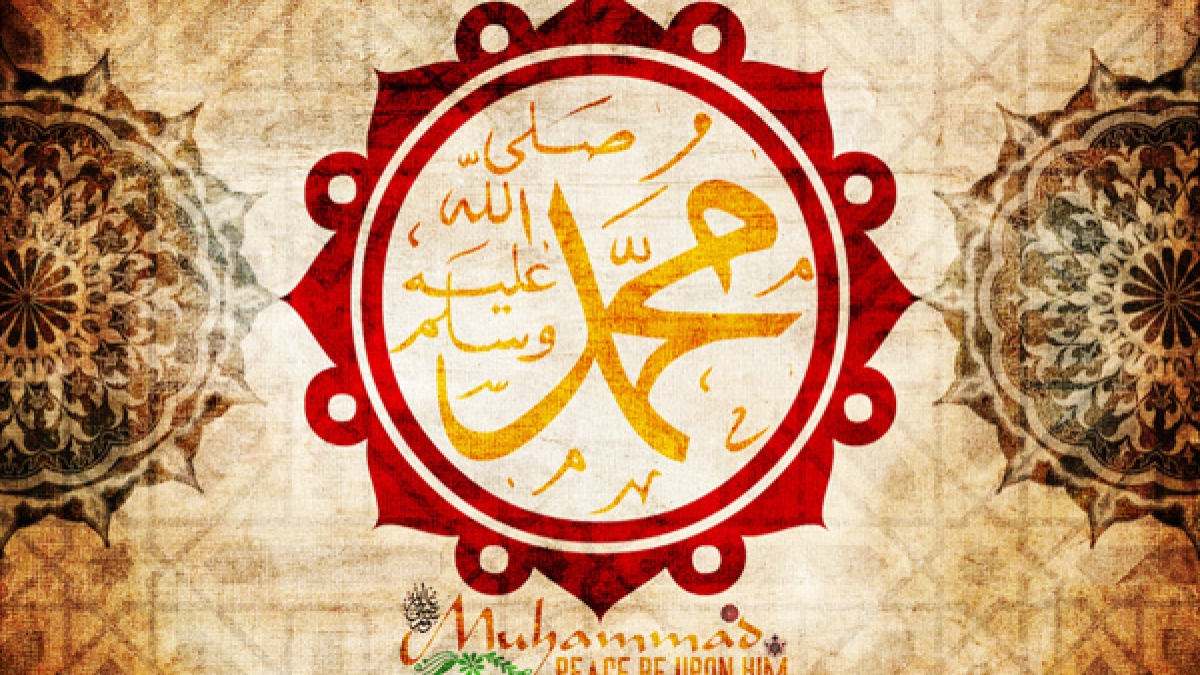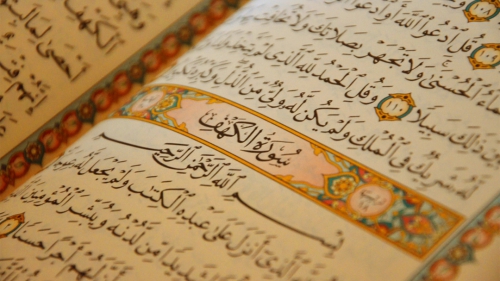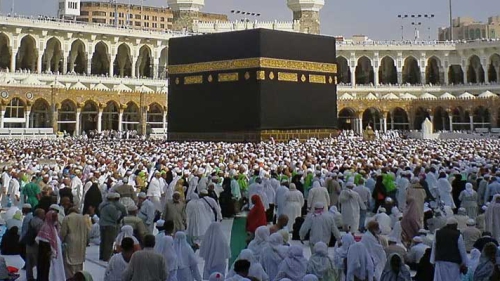Muhammad (S.A.W): A Mercy for Mankind

To all my Muslim friends, As Salamu Alaikum Wa Rahmatullah Wa Barakatuhu. And to all my non-Muslim friends, simple English translation would be "May the Peace, Mercy, and Blessings of Allah be upon you." I am deeply saddened to hear about the incidents that are happening all over the world regarding the issues between Muslims and non-Muslims. And only recently, has this so-called movie "Innocence of Muslims" shown up at the top of the list.
To all my non-Muslim friends, especially the Americans, I am truly sorry for your recent loss. I want you to know that you have our sincerest condolences. And as for this so called movie that claims to expose the nature of our beloved Prophet (S.A.W), I want you all to know that this is nothing more than a great blasphemy against our beloved Holy Prophet (S.A.W) and what we Muslims believe in! For those who are sensible enough, I think they will get the point.
As for those who do not, those who made this ridiculous video and those who back the person who made this video by saying that he's only practicing his right of freedom of speech, let me tell you this:
Like everything, even freedom of speech has a certain limit that a person is not supposed to cross. That is, you are only given this right, so that you can practice it responsibly. Just think about this for a second...Forget about the movie, forget about Islam for a moment and just think for a second. If you want to say something that you know is going to cause an uproar among a certain people with certain religious beliefs, that is totally negative about that religion and it's also about something that those people hold really dear to their hearts, do you honestly think that everything's going to turn out just fine without any consequences? To a logical mind, this doesn't make sense.
Our Love for our Prophet Muhammad (S.A.W) is only second to the Love that we have for our Creator, Allah. And if what I've said till now made sense to you, do you honestly believe that you can just criticize one of the greatest creation of this Universe? Are you willing to sacrifice the peace that we all have right now for hatred among one another?
If you just think about it, your mind will tell you that all of this hate, all these despised acts are against one's logical reasoning. So I ask you, please refrain from causing mischief among all of us.
Have you ever wondered why we love the Holy Prophet (S.A.W) so much? There are countless examples from every aspect of his blessed life to ponder upon, and I admit I'm not doing justice to his noble life by just listing a couple examples, but in order to just give you a glimpse, I feel this is necessary.
After the death of two people most beloved to him, first his uncle, Abu Taalib (who had protected him from the people of Makkah), and after a couple of weeks, the death of his wife Khadija (who had been by his side throughout his mission as the Messenger of Allah), the emotional impact on the Holy Prophet (S.A.W) was so severe that this year was called 'the year of sorrow'. And if these two incidents were not enough, the same year, a third incident occurred, and that incident is known as the 'Incident of Taif'.
There is a city close by to Makkah, around 80 km away, and is known by the name Taif. After preaching Islam in Makkah for 10 years, the Prophet (S.A.W) decided to leave and try somewhere else. He thought that maybe the people of Taif would perhaps listen to the message and maybe they would be more inclined to accept the truth.
Once Aisha (R.A), the wife of the Holy Prophet (S.A.W) asked, 'O Messenger of Allah, was there any day more difficult to you than on the day of the battle of Uhud?'' (For those who don't know, on the battle of Uhud, the Prophet (S.A.W) was wounded, blood was coming from his blessed face, his teeth were dislodged, and even an arrow came and hit him. Much happened on the day of Uhud).
The Prophet (S.A.W) said, 'Yes, the day of Taif was worse for me than the day of Uhud; that was the most difficult point of my life'. (I.e. This day of Taif had a very profound impact on the Prophet (S.A.W))
When the Prophet (S.A.W) approached the tribe of Saqeef (the inhabitants of the city of Taif), he asked to meet the chief of the town, and the chiefs of the town were in fact three brothers (Their father was once the chief of the city, but once he died, the brothers decided to share the power among each other). So the three chiefs agreed to meet the Prophet (S.A.W) as they didn't know why he (S.A.W) wanted to meet them. When the Prophet (S.A.W) introduced him as the Messenger of Allah, told them about Islam, about worshipping only one God, and leaving idol worshipping, the three brothers ridiculed and insulted him in the worst possible manner. One of them said, 'If you are a Prophet, I might as well destroy the Kaabah' (meaning what's the point), another said, 'Did Allah not found any one better than you to send? You are the one He has chosen?', the third one said, 'If you are a Prophet, then you are too Holy for me to speak to, and if you are not a prophet (i.e. if you are a liar), then you are too ignoble for me (a noble man) to speak to' (i.e. either way, you are somebody I cannot speak to.)
But this wasn't the end of it, the three brothers then commanded their slaves and the youth to ridicule the Prophet (S.A.W) and make fun of him. Also, to physically harm him by throwing stones at him, by pelting him as he was leaving the city. So, the Prophet (S.A.W) was forced to leave the city while the people are ridiculing him, insulting him, and throwing stones at him, so much so that the blood began to pour from his body and that his shoes became soaked with his own blood. As he ran outside the city, he himself narrates to Aishaa, 'that I could not remember where I was going'. He was in such a state of shock that he did not know where he was until he reached a garden a few kilometers outside of Taif. The people of Taif had stopped chasing him, and he sat down, tired and bleeding, being tortured and humiliated by the people of Taif, all alone under a tree. There he (S.A.W) made a dua (call) to Allah (S.W.T) and said:
"O Allah! I complain to You of my weakness, my scarcity of resources and the humiliation I have been subjected to by the people. O Most Merciful of those who are merciful. O Lord of the weak and my Lord too. To whom have you entrusted me? To a distant person who receives me with hostility? Or to an enemy to whom you have granted authority over my affair? So long as You are not angry with me, I do not care. Your favor is of a more expansive relief to me. I seek refuge in the light of Your Face by which all darkness is dispelled and every affair of this world and the next is set right, lest Your anger or Your displeasure descends upon me. I desire Your pleasure and satisfaction until You are pleased. There is no power and no might except by You."
At this point, the Prophet (S.A.W) said 'I saw a cloud hovering above me, and lo and behold, I saw Jibreel (Angel Gabriel) came down from that cloud, and besides him was an angel that I had never seen before.' And Jibreel said to the Prophet Muhammad (S.A.W), 'O Muhammad (S.A.W), your Lord has seen how your people have responded to you, your Lord has seen what they have said to you, so he has sent me with the angel of the mountains to place at your disposal.'
The angel said, 'O Muhammad (S.A.W), if you want, command me and I will cause the two mountains of Taif to collapse upon them.' (For those of you who don't know, Taif is situated on some type of plateau, and the city is in between these two mountains, and the angel asked the Prophet (S.A.W) if he should just squash the people between the same mountains whose pebbles they used to stone the Prophet (S.A.W) with.)
The Prophet (S.A.W), still bleeding and his shoes still wet with blood says, 'No! Rather, I pray that Allah (S.W.T) blesses their children to be Muslims and worship Allah (S.W.T) alone. Even if they have rejected Islam, I pray that Allah (S.W.T) blesses their progeny to be Muslim.' SubhanAllah!
This was truly one of the greatest miracles and one of the most compassionate moments of the Prophet (S.A.W). So many are the lessons we learn from this incident. First and foremost, look at the trials and tribulations the Prophet (S.A.W) was afflicted with, all of this so that he could spread the word of Allah (S.W.T) and so that he could spread the message of Islam. He was physically tortured, ridiculed and insulted by an entire city. Nobody was there to support him except Allah (S.W.T). Look at the prayer that the Holy Prophet (S.A.W) made to Allah! That O Allah, as long as you're not angry with me, as long as your anger is not descending upon me, I don't care what happens with me. His main concern was the pleasure of Allah, not how mankind treated him! His main concern was that Allah (S.W.T) sends His blessings upon him. Just imagine for a second, the Prophet's (S.A.W) ears were still ringing with the torture and the taunts of the people, the sarcastic comments and remarks had not been forgotten, the blood had not yet dried and was flowing, and yet in that state, he still forgave and made a prayer for the people of Taif, and he said at least let their children be Muslims O Allah (S.W.T). Just look at the love and concern he had. He showed the side of mercy and leniency, and that is why Allah says in the Quran,
'We have only sent you as a means of mercy for the entire world'. (21:107)
My friends, the miracle here is not that Allah sent the angel at the Prophet's (S.A.W) disposal to crush the people of Taif, the miracle isn't that Allah responded to the prayer of the Prophet (S.A.W) instantaneously, no! The real miracle is the forgiveness of the Prophet (S.A.W) at this time. The real miracle is that the Prophet (S.A.W) overlooked what the people of Taif had done, and he chose to forgive and forget, and to make prayer for the people of Taif because if the Prophet (S.A.W) had willed, there would be no city of Taif right now, but instead he made a prayer for them, and to this day, Taif is a city of Islam. To this day, it is a holiday resort where families go to take their children, it's a place where Muslims go to celebrate, it's a place for Muslims to go to enjoy the beauty of the people and the surroundings, and if Allah (S.W.T) had willed, there would be no city of Taif today, but such is the mercy of our Prophet (S.A.W) that the city of Taif continues to remain and thrive to this day.
He also taught us a very valuable lesson regarding emotions. The Holy Prophet (S.A.W) was indeed grieved by this incident, he was hurt, and didn't realize where he was until he arrived at the garden. When the angel came, the Prophet (S.A.W) did not react emotionally, rather he acted logically and intellectually. He allowed his emotions to be controlled and he reacted in a wise and very humane manner. *(1)
And you still ask us why we love him?
On the Day of Judgment, when time will be excessively long and extremely difficult to pass with the sun over our heads and the fire of Hell too close. On that day the sun will burn with ten years of heat. The state of thirst (may our Lord never show us), the heat (may our Lord save us) will be so severe that the perspiration will be absorbed in the ground causing it to overflow, which in turn will cover the people up to their necks. The level of perspiration will be enough for ships to float on, but in reality people will be drowning in it. They will be extremely terrified as if their souls are stuck in their throats.
Exhausted of these terrifying torments they will start looking for an Intercessor. They will all turn to Adam , Nooh (Prophet Noah), Ibrahim Khalilullah (Prophet Abraham) , Moosa Kaleemullah (Prophet Moses) and Isa Roohullah (Prophet Jesus) but will receive the reply that they can't bear to hear. All the Prophets will acknowledge that they don't have the rank, are not worthy of and do not have the power to open the door of Intercession. They will say, 'Today we are worried about ourselves, go to somebody else'.
Finally they will reach the Beloved of Allah, the Seal of the Prophethood, the Master of the first and the last, the Mercy of the Universe who will proclaim, 'I am for this, I am for this, I am the Intercessor'. He will then turn to his Lord and go into prostration. His Lord will state, 'Ya Muhammed! Lift your head, say and you will be heard, ask and you will be granted, Intercede and your Intercession will be accepted.'
This is the 'Maqam-e-Mehmood' where all the people from the beginning to the end will praise the Holy Prophet (S.A.W). All those who believed and disbelieved will witness the distinctive status that the Holy Prophet enjoys in the Court of Allah Almighty and the prominence that he holds. All Praise is to Allah.
This is the reason that the people will be made to go to all the other Prophets only to be turned away disappointed showing that no one on that day, will have the power and authority to open the door of Intercession other than our Beloved Prophet (S.A.W). All this is narrated in Bukhari Sharif and Muslim Sharif alike and is too long and well known to be quoted. *(2)
My friends, we love him (S.A.W) more than our own selves, so please do not insult the Best of Mankind again!
And now for all my Muslim brothers and sisters: Go back to Allah's Book, and try to understand the world for what it really is.
Keep this in mind that only Allah can help us! Whatever's happening right now, it's only supposed to increase our faith. We heard the Messenger of Allah (S.A.W) tell this to us 1,400 years ago.
"The People will soon summon one another to attack you from every place in the same way that a pack calls around its prey" Someone asked, "Will that be because of our small numbers at that time?" He replied, "No, you will be numerous at that time: but you will be froth and scum like that carried down by a torrent (of water), and Allah will take the fear of you from the breasts (hearts) of your enemy and cast al-wahn into your hearts." Someone asked, "O Messenger of Allah , what is al-wahn?" He replied, "Love of the world and dislike of death." [An authentic hadith recorded by Abu Dawud and Ahmad]
So, once we all have reaffirmed our faith, promise to yourselves that you will respond to these situations by saying that "Allah is enough for us" and "He is enough to take care of all of our matters."
And to all those who want to protest, please remain steadfast, and protest ONLY in a calm manner because violence only appeals to the minds of the illiterate and uneducated. We do not want any wounds inflicted on the image of Muslims or the Holy Prophet (S.A.W).
We also need to understand one thing, Allah (S.W.T) will NEVER let our Prophet (S.A.W) be embarrassed or disrespected, not in this world and not in the next. So don't even worry about these shameless tactics. Trust me, they're all in vain. So just stop, just stop the violence, stop thinking about taking revenge etc. and start turning back to Allah and ask for His guidance and help. Surely, He alone is our Protector and Friend. The people pursuing these shameless acts, surely, they do not have a Protector.
And just to give you all a small example in order to explain what I mean, here's a small narration that happened during the life time of the Holy Prophet (S.A.W):*(3)
During the Banu Al-Mustaliq Expedition, Jaabir inb 'Abdullah said, "We were on a military expedition, and during it a man from the Muhajiroon kicked a man from the Ansaar. The Ansaar said, 'Help, O people of the Ansar.' And the Muhajiroon man said, 'Help, O people of the Muhajiroon.' Hearing those cries for help, the Messenger of Allah (S.A.W) said, 'What is the matter with you that you make a call from the pre-Islamic times of ignorance ? (i.e., you are not calling help from your fellow believers, but instead from your fellow tribesmen, which is a characteristic not of Islam, but of ignorance)'
They said, 'O Messenger of Allah (S.A.W), a man from the Muhajiroon kicked a man from the Ansaar.' The Prophet (S.A.W) said: 'Leave it (i.e., abstain from making the call for help that you made), for it is evil.'
Hearing about what just transpired, Abdullah ibn Ubai said, 'Did they really do that? Lo! By Allah, if we return to Madeenah, the noble ones among us (i.e., the native dwellers of Madeenah) will expel the ignoble ones among us (i.e., those who migrated to Madeenah.)' Ibn Ubai's words were conveyed to the Prophet (S.A.W) and Umar (R.A) [who was in his company] said, ' O Messenger of Allah, allow me to strike the neck of this hypocrite (i.e., Ibn Ubai).' The Prophet (S.A.W) said: 'Leave him. Let not people say that Muhammad kills his companions.' *(4)
According to one narraration, 'Umar ibn Al-Khattab (R.A) said to the Prophet (S.A.W), "Order 'Abbaad ibn Bishr' to kill him," to which the Prophet (S.A.W) responded:
"Then how will it be, O 'Umar, when people say that Muhammad kills his companions. No, announce that we are departing [from here]."
It was a time of the day during which the Prophet (S.A.W) never left camp and resumed a journey, but that day was an exception. *(5)
Here the Prophet (S.A.W) taught us the importance of weighting the benefits and harms of an action before arriving at a final decision regarding it. When it comes to government and to the affairs of the state, reputation counts. Public perception, both among Muslims and non - Muslims can have a significant effect on people's decision about Islam. After all, there was a great difference between people saying how much the Companions (R.A) loved the Prophet Muhammad (S.A.W), and between people saying that Muhammad (S.A.W) killed his Companions (R.A). So, yes, Ibn Ubai, based on his vile deeds, deserved to die; but killing him would have led to an evil that was greater than the benefit that would have been derived by killing him.
This lesson was taught to us almost 1400 years ago, and we're being tested right now. My sincerest advice to all of you, think wisely before you do/say anything. Think about the consequences of your actions before doing them.
Lastly, I conclude with one of the verses of the Holy Quran that immediately came to my mind when I started to grieve about the situation:
"(Believers), you will certainly be put to test in regard to your properties and lives, and you will certainly hear many hurtful things from those who were granted the Book before you, and from those who have associated others with Allah in His Divinity. If you remain patient and God-fearing this indeed is a matter of great resolution." (3:186 )
SubhanAllah! So what does this tell us? That this is all a test my friends, this is all a test. May Allah (S.W.T) have His Mercy on all of us, and may He guide us all towards the right path. (Ameen)
References:
*(1) All credit goes to Yasir Qadhi for his beautiful words (that he used to describe the incident of Taif) that I just had to write down in this article. Though I had to shorten it to fill the article's needs (i.e. some details from the video haven't been mentioned here), but nonetheless, all credit goes to him. His video can be found on you tube by the name '16 - The Life of Prophet Muhammad (pbuh) - Incident of Taif - Sh. Yasir Qadhi'
*(2) Taken from the Article Intercession By The Holy Prophet (S.A.W) Author: Imam Ahle Sunnat Aa'la Hazrat, Imam Ahmed Rida Khan
*(3) Taken from the Book 'The Biography of Caliph Umar Ibn Al Khattaab (R.A) Volume 1' by Dr. Ali Muhammad Muhammad As Sallaabee (From pages 124-126)
*(4) Refer to As-Seerah An Nabawiyyah As-Saheehah (2/409). At-Tirmithee, Bukhari, Muslim and Imam Ahmad also related this narration.
*(5) Refer to As-Seerah An Nabawiyyah, by Ibn Hishaam (3/319)
*****
Ali Riaz is a member of MSA at Illinois Institute of Technology.
Topics: Mankind Values: Compassion, Forgiveness, Mercy Channel: Opinion
Views: 53847
Related Suggestions




















